#JimCrowed is when Black people are exploited by old, racist Jim Crow laws today. If you are Black and your land was stolen, you were #JimCrowed. If you are Black and your right to the truth is denied, you’ve been #JimCrowed. In honor of Black History Month, this special edition looks at an instance of Jim Crow and Black land ownership. Guest writer William T. Butler Jr., talks about challenges to his family’s North Carolina land.
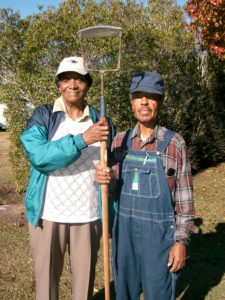
Photo by William ‘Tommie’ Butler Jr., inspired by
‘American Gothic’ by Grant Wood. Photo taken, 2015, Hallsboro, NC.
Jim Crowed, By William T. Butler Jr.
We have all experienced at least one “Jim Crow” incident in our lives, one that left us thinking: “This is what our fore parents had to put up with.” One of those moments, happened to me recently when the Columbus County North Carolina Office of Taxation, decided to give away my grandparent’s rural homestead. Located in a part of coastal North Carolina, Ransom Township, the relatively small parcel of land had no liens, no unpaid taxes, and was not for sale. One day in 2018, it mysteriously disappeared off the books of Columbus County North Carolina Office of Taxation.
After the Great Depression
It might surprise you to learn how or why this could happen. First, let me tell you something about my late father, William T. Butler Sr. aka “Bud,” a family man and patriot living in the rural Cape Fear Region, by Lake Waccamaw, North Carolina in the late 1930s. After the Great Depression, he dropped out of North Carolina Agriculture and Technical State University to work at the local lumber mill to help support his parents and younger siblings. When World War II broke out, he enlisted in the Army to earn more money.
During his tour of duty, he served in combat with distinction in every major theater of battle from the Normandy Invasion to the liberation of Nazi concentration camps in Eastern Europe. Before leaving home, he had promised his siblings and parents to keep them safe and fed at home. Back again from Europe, my grandfather urged my father, to move up North, for the safety of his young family, wife, Vivian, and their first child, David, my older brother. When my father was a child, one of his mother’s nephews had been lynched by a white mob in their hometown. After returning home from the war, wearing his uniform decorated with valor medals, another cousin was lynched. The KKK White Supremacists had declared war on Black veterans!
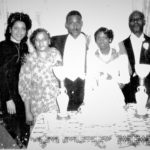
Krease (late, stepfather to my mother); Alice Murphy-Krease (late,
mother of my mother).
Photo by Maryellen Butler (late, sister of the father).
Location: Father’s Parents homestead in Randsome Township, NC.
Never missed a payment
So, my father settled in Brooklyn, New York in 1950 where I was born followed by my younger sisters, Valarie, and Aliya. My father continued to financially support his sisters, until they were each married and his parents until their deaths, all while he lived far from them in Brooklyn. Among the many things that my father drilled into our heads was his mantra: “Always pay your property taxes! It’s key to owning your land.” So, 53 years later, when named, Executor of his estate in 2003, I automatically and religiously paid the annual taxes on all our North Carolina properties. I never missed a payment.
It took me nearly ten years to settle the books before I could begin to focus on the old family homestead. One day I had the idea to find pictures of the old homestead online at Terraserver.com. I called the Columbus County North Carolina Office of Taxation because this required some very specific information: 1.) Associated Coordinates X (easting) and Y (northing); 2.) Location (RANSOM TWSP); 3.) Land Parcel Property No. (27875); 4.) Account No. (15-08080); and 5.) Patience. Handling local real estate transactions and paying Columbus County tax bills, I spoke with office staffers at least twice every year for the past for 17 years. Some of the personnel would recognize me and comment on my “out of town” voice.
Deed in my hand
When I called recently, I held a copy of our old homestead deed in my hand. The person on the other end of the phone said: “There’s no deed on file matching your inquiry.” I responded: “There must be a mistake. I have the deed in my hand. Better check again.” After a long hold, the representative came back to inform me that deed is now listed as owned by a couple living on Silverspoon Road, Tatum Township, North Carolina. Shocked, I had three questions: 1. How and when did they get ownership of my land? 2. What are the rules regarding conflicting tax collection? 3. What about refunds with compounded interest and penalties?
I exhaled for one moment
After another long hold, the voice on the other end of the phone said: “We’ve found the original deed registered by your grandparent’s in 1922.” I exhaled for one moment. But there were some problems, of course: 1. The original parcel demarcation is no longer discernible. An accurate calculation cannot be made. 2. I must submit newly updated deed at my expense. A new deed registry requires: a. Land Survey to calibrate exact property line coordinates. b. I will need to complete a new filing of an up-to-date deed with Columbus County Office of Taxation, and c. registration requires hiring a North Carolina licensed real estate law firm. The proposed alternative solution was to close the existing tax account. No refund was allowed.
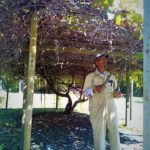
Black farmers and landowners
I took my complaint to the North Carolina Land Loss Prevention Project (LLPP) and they agreed to represent my case. Founded in 1982 by the North Carolina Association of Black Lawyers, this organization provides legal support and assistance to financially distressed and limited resource Black farmers and landowners in North Carolina.
Why share this story with you? Maybe you know something about my family, this part of North Carolina, and how land was measured and demarcated in the old days. If so, you may be able to help. Please share your collective old family memories, memorabilia, source materials, photos, and old stories. Your old photographs, letters or treasured memories may contain a missing piece to this family puzzle. I am asking you to help us save our land. Talk with the family elders, tell them what we are trying to accomplish. Get the word out across the country to family members, friends, neighbors, and allies.
Large family network
My initial target audience for this story was my large family network, especially those descended from one Jane Webb, born free in colonial era Northampton County Virginia in 1699. She was the first person of color to take a slave owner to court in an effort to free her family. Actual court records tell a fascinating story of this woman who took on the slavery system in colonial courts for ten years until finally reaching Virginia’s Supreme Court. She stood defiant, even public lashings, harassment, humiliations, and threat of death didn’t deter her. I believe my story should be important to everyone. This is a focus on hard-earned Black land ownership and how we have lost untold acres of land over the last century through tricky rules. Perhaps this happened to you! I want people to know, to feel, to believe that this land theft is happening now in 2019!
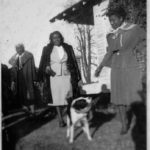
A Huckleberry Finn movie
Back in the old days, homes in rural America really didn’t have addresses. Perhaps this is hard to believe but I witnessed this personally as a child. Anyone that says different just doesn’t know what he or she is talking about. I can remember when there were no streetlights, signs, paved roads, and house numbers. Most children ran around barefoot all summer. For me, it was like visiting a Huckleberry Finn movie every summer. Rural and urban people live very different lives. I once asked why there were no street signs or house numbers and the simple answer was: “Everybody knows where everybody lives.” Land demarcations and measurements simply identified deed title. That old pre-computerize recording system made possible what has happened in my case and has been used to rob lands from countless other people.
Needle in a haystack
In North Carolina, our land is a relatively small parcel surrounded in every direction by thousands of miles of vast lands both wooded and rural within a huge state. The difficulty of finding it is greater than searching for a needle in a haystack. The archaic recording process makes it even harder. I believe this is by design, no accident. Over time thousands of small parcels began to comprise vast large parcels in the hands of large land developers. Today, the old Klan methods of violence are wasteful and inefficient. Control of information is the more powerful way Jim Crow laws are employed–silent, cost-effective and far more permanent.
The really crazy thing
I don’t know how those names got on a new deed for my property. The Land Loss Prevention Project will handle it. I know I didn’t sell any land to those people. I think my unexpected call prematurely threw a wrench into their game. The calm way I responded was unexpected. I will not say that the whole town was in on it. But everyone knows that this has gone on for generations. The really crazy thing is everyone born and raised in this part of North Carolina are all related to each other whether they are Black, Indigenous, or White! One way or another all these people have their neighbor’s blood on their hands and running through their veins. And the lynchings that have been documented will never equal those that are still unknown.
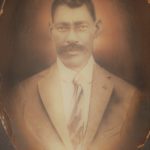
For you genealogists out there
Think about this story if you are descendants of Jane Webb who are spread near and far across this country and around the world. For you genealogists out there, the family names are: Willie Moseley, Ellen J. Moseley, Christian Webb, Henry Butler, Mary L. Butler (direct descendent of Jane Webb), Walter Mosley, and John Knowles. If you recognize any of these name(s) from your own family history research, please share. I can talk to you about my grandparents and their farm, as I regularly visited them for over sixty years. My deed description states “chain and stakes” measurements. I’m looking for equivalency of 1922 measurement to measurements used today.
This has truly been a learning experience for me. My lovely niece, Atiya Butler, my late brother David’s daughter, is our family historian and genealogist. Her dedication and insights fueled my deeper journey into our family history. My ancestors brought me thus far and likely the reason that I have no fear or doubt of a positive outcome. We can prove that it is possible to unite for the good of all. Let’s deny wrongful takers what they would take. Once this case is resolved, I’d like to invite everyone to stand with us by a plaque on our land that states simply: “The hardest challenges are the simple ones only you can accomplish.”
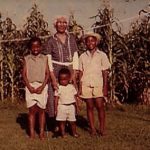
About the author: William T. Butler Jr. aka, Tommie, is a Brooklyn writer, gardener and stage production guru living in Atlanta, Ga.
Black families, Who’s minding your land down South? Do you know anyone whose land was sold from under them, without their knowledge? Please share your comments.